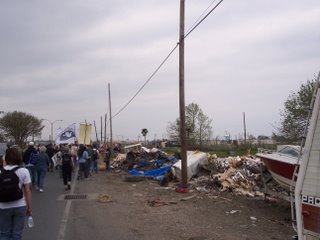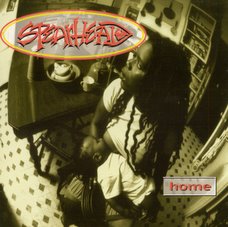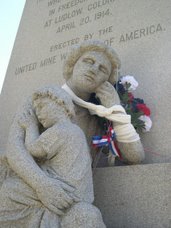
Walking Beyond New Orleans,
What are our next steps?
by Stan Goff
Territory: from terra, meaning soil or land.
They love it when we struggle over policy, because abstraction always works in their favor. They love it when we fight for an issue and not a program, because they can throw up more initiatives than we have to power to confront.
What they are doing in Iraq and the Gulf Coast is taking away other peoples’ territory… which is the geographic basis of sovereignty… and that sense we name “home.”
Home were the twin demands: Bring the troops HOME. Bring the survivors HOME. Bring us to our sense of place.
The basis of the struggle for social transformation is the struggle to assert POPULAR sovereignty against elite sovereignty.
Soldiers fight for territory, taking it from others, defending their own, or defending the territory of others. We just struck the first of many blows to defend the sovereignty of both Iraq and the residents of the Gulf Coast. We have adopted non-violence as a strategy, but that doesn’t mean we don’t understand that we are at war with war, that we seek to take the power of the powerful, or that we are coming off the defense and onto the offense. We have turned a corner, and now it is up to us to move forward on the other side of that turn.
We walked, and that is why we know the land, the homes — many shattered by wind and flood — that we are helping people defend. We have to understand the implications of this. We have become a Department of HOMEland Security for the oppressed, only we are talking about real homes and not some national-fascist fatherland abstraction.
This movement has struggled for some time with several questions. Why are we so white? Why do we have such minimal participation from black and brown? How do we reach out? How can we stop those in power from ignoring us?
We may have stumbled upon the answers to some of those questions by doing what we just did.
Those with some social privilege are always — historically — the people who have the educational, financial, socio-cultural, and organizational advantages available to them to be more effective when they are politically radicalized. When movements are organized around issues like the war and foreign policy, those in the best position to struggle around these global issues are those who are less preoccupied with more immediate issues of survival for themselves and their families. So the privileges of class, race-nationality, and gender are reflected in the very movements that have declared themelves against expolitative power.
In many cases, these movements also reflect a kind of myopia. We have missed the struggles that are going on all around us, precisely because we have a degree of citizenship… we are listened to and taken seriously by the establishment. The struggles we have missed are those that affect those who are treated as less-than-citizens… be they African Americans, Hispano-Latinas, or Indigenous Nations… women, LGBT, young people.
We must grasp the difference between a citizen and a subject, because this is the difference between colonizer and colonized. And that colonial status breaks down when the citizen converts the privileges of citizenship into resistance by placing that privilege in the service of the subjects... of the subjugated. We turn the class privilege into a weapon against class. We turn the privileges of men against male supremacy, and heterosexual normacy against oppressive sexual norms. We turn the privleges of whiteness against white supremacy. We turn the valorization of the military in a militarized society against militarism. We turn territorial privilege into a weapon to regain the lost territory of the subject... and we redefine citizenship in a new country, in liberated territory, figurative and literal.
We went to the Gulf Coast and we connected the war aborad with a war at home. Let’s think about what we mean when we say “war at home.” What does it look like, this war? Who is this war aimed against? How is it fought? These are the things we need to know in order to fight back.
In both Iraq and the Gulf Coast, brown, foreign, and poor people have been subjected to at least two perfectly similar assaults: the attempt to take their territory, and the attempt to impose control over them as a population.
In our trip across the Gulf Coast, we took a couple of important first steps to deal with the questions raised above. We went to the heart of the nation’s Black Belt. We accepted Black leadership, male and female. We shared resources with African American organizers on THEIR home bases. We met with and formed relationships with everyday Black, Native Nations, Hispano-Latina, Vietnamese, and poor white people in the region. We collaborated with Black folk through the only institution over which they still retain control — the Black church — which is also the locus of African American community organizing. We prioritized THEIR issue, and committed to follow through. And now we have the potential to contest with those in power, in solidarity with the people with whom we have met and to whom we have committed, to defend their homes against the encroachments of what promises to be the most massive gentirifcation project in American history.
We have positioned ourselves for a fight to defend the homes — the territory — of our allies. This could become a new kind of fight, and making the issues land, popular sovereignty, and the fight against militarized population control (especially against the prison-industrial complex and felony disfranchisement), we have taken on a new quality of struggle… and one that applies equally to the occupation of Iraq and the occupation of the Gulf Coast.
Not only does the fight against gentrification and lockdown in the Gulf Coast go straight to the heart of the oppression unmasked there by the hurricane and the government’s response, these two issues can be linked to the issue of the war nationwide, and thereby centralize the immediate and emergency concerns of black, brown, and poor people all over the country.
These are talking points that can be developed and popularized, linked to ongoing struggles around the country, and that we can carry as a battle standard to the Gulf Coast as follow up.
Some folks at IVAW already want to organize a 2006 Summer Reconstruction Collective for the Gulf Coast. We find the funds for them. They stay at Slidell. They work in one community to build strong local relationships there throughout the summer — June through August. Over one selected week, with a few days fore and aft to total a week, the same IVAW Summer Reconstruction Collective organizes and runs a weeklong reconstruction blitz, with Vets for Peace, especially Vietnam Vets, coming down to work a plan conceived BY IVAW.
Dave Cline and I were talking, and he is suggesting a parallel, two-step campaign… one I want to endorse in its general outlines. “Home by Christmas” as part of the Bring Them Home Now! campaign, that whips the living hell out of Congress — followed by a build up of marches similar to the one we just did, but across individual states, culminating in state capitols across the country. Detroit to Lansing. Fayetteville to Raleigh. Bay Area to Sacramento. Albuquerque to Santa Fe. Portland to Salem. Newark to Trenton. And on and on. Four or five day walks and caravans, camping again, landing each night in some community under assault by thuggish police, by gentrifiers, or economic crisis. Linking with African Americans, Hispano-Latinas, Native Nations. Joining their issues, accepting their leadership, and sharing our resources. Converging in state capitols on the fourth anniversary of the war, with our motley marchers, led by vets, especially Iraq vets, and our peace-train convoys of cars… a new popular democracy struggle on the move.
A program that is not trapped in policy, but tied to territory. A revolution that knows how to dance (we did that well, didn’t we, in the street and in the camps?). A movement that is coming off the defensive and taking it to them, one day’s march at a time. Let’s teach people how we learned to love and lose our fear.
Just a riff in my head. I’m still padding down Highway 90, drinking Grumble’s coffee, hearing your drums, huggin’ y’all goodnight.
Cross country, like a fuken justice army… still can’t believe we did it.
posted 26 march 2006













No comments:
Post a Comment